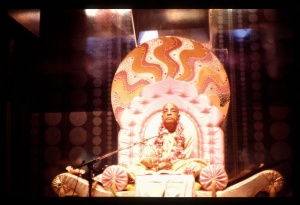CC Madhya 9.158 (1975): Difference between revisions
(Vanibot #0027: CCMirror - Mirror CC's 1996 edition to form a basis for 1975) |
(Vanibot #0020: VersionCompareLinker - added a link to the Version Compare feature) |
||
| Line 2: | Line 2: | ||
<div style="float:left">'''[[Sri Caitanya-caritamrta (1975)|Śrī Caitanya-caritāmṛta (1975)]] - [[CC Madhya (1975)|Madhya-līlā]] - [[CC Madhya 9 (1975)|Chapter 9: Lord Śrī Caitanya Mahāprabhu's Travels to the Holy Places]]'''</div> | <div style="float:left">'''[[Sri Caitanya-caritamrta (1975)|Śrī Caitanya-caritāmṛta (1975)]] - [[CC Madhya (1975)|Madhya-līlā]] - [[CC Madhya 9 (1975)|Chapter 9: Lord Śrī Caitanya Mahāprabhu's Travels to the Holy Places]]'''</div> | ||
<div style="float:right">[[File:Go-previous.png|link=CC Madhya 9.157 (1975)|Madhya-līlā 9.157]] '''[[CC Madhya 9.157 (1975)|Madhya-līlā 9.157]] - [[CC Madhya 9.159 (1975)|Madhya-līlā 9.159]]''' [[File:Go-next.png|link=CC Madhya 9.159 (1975)|Madhya-līlā 9.159]]</div> | <div style="float:right">[[File:Go-previous.png|link=CC Madhya 9.157 (1975)|Madhya-līlā 9.157]] '''[[CC Madhya 9.157 (1975)|Madhya-līlā 9.157]] - [[CC Madhya 9.159 (1975)|Madhya-līlā 9.159]]''' [[File:Go-next.png|link=CC Madhya 9.159 (1975)|Madhya-līlā 9.159]]</div> | ||
{{CompareVersions|CC|Madhya 9.158|CC 1975|CC 1996}} | |||
{{RandomImage}} | {{RandomImage}} | ||
==== TEXT 158 ==== | ==== TEXT 158 ==== | ||
| Line 11: | Line 10: | ||
<div class="verse"> | <div class="verse"> | ||
:agādha īśvara-līlā kichui nā jāni | :agādha īśvara-līlā kichui nā jāni | ||
:tumi yei kaha, sei satya | :tumi yei kaha, sei satya kari' māni | ||
</div> | </div> | ||
| Line 18: | Line 17: | ||
<div class="synonyms"> | <div class="synonyms"> | ||
agādha—unfathomable; īśvara-līlā—pastimes of the Lord; kichui—anything; nā jāni—I do not know; tumi—You; yei—whatever; kaha—say; sei satya—that is right; | agādha—unfathomable; īśvara-līlā—pastimes of the Lord; kichui—anything; nā jāni—I do not know; tumi—You; yei—whatever; kaha—say; sei satya—that is right; kari' māni—I accept. | ||
</div> | </div> | ||
| Line 25: | Line 24: | ||
<div class="translation"> | <div class="translation"> | ||
"The transcendental pastimes of the Lord are unfathomable, and I do not know anything about them. Whatever You say I accept as the truth. | |||
</div> | </div> | ||
| Line 34: | Line 33: | ||
This is the way to understand the truth about the Supreme Personality of Godhead. After hearing the Bhagavad-gītā, Arjuna said very much the same thing: | This is the way to understand the truth about the Supreme Personality of Godhead. After hearing the Bhagavad-gītā, Arjuna said very much the same thing: | ||
:sarvam etad ṛtaṁ manye yan māṁ vadasi keśava | :sarvam etad ṛtaṁ manye | ||
:na hi te bhagavan vyaktiṁ vidur devā na dānavāḥ | :yan māṁ vadasi keśava | ||
:na hi te bhagavan vyaktiṁ | |||
:vidur devā na dānavāḥ | |||
"O Kṛṣṇa, I totally accept as truth all that You have told me. Neither the demigods nor the demons, O Lord, can understand Your personality." ([[BG 10.14 (1972)|Bg. 10.14]]) | |||
It is not possible to understand the truth about the pastimes of the Lord simply by using our own logic, argument and academic education. We must receive bona fide information from the Supreme Personality of Godhead, just as Arjuna received information when Kṛṣṇa spoke the Bhagavad-gītā. We have to accept the Bhagavad-gītā or any other Vedic literature in good faith. These Vedic scriptures are the only source of knowledge about the Lord. We must understand that we cannot comprehend the Absolute Truth by the speculative process. | |||
It is not possible to understand the truth about the pastimes of the Lord simply by using our own logic, argument and academic education. We must receive bona fide information from the Supreme Personality of Godhead, just as Arjuna received information when Kṛṣṇa spoke the Bhagavad-gītā. We have to accept the Bhagavad-gītā or any other Vedic literature in good faith. These Vedic | |||
</div> | </div> | ||
Latest revision as of 20:40, 27 January 2020

A.C. Bhaktivedanta Swami Prabhupada
TEXT 158
- agādha īśvara-līlā kichui nā jāni
- tumi yei kaha, sei satya kari' māni
SYNONYMS
agādha—unfathomable; īśvara-līlā—pastimes of the Lord; kichui—anything; nā jāni—I do not know; tumi—You; yei—whatever; kaha—say; sei satya—that is right; kari' māni—I accept.
TRANSLATION
"The transcendental pastimes of the Lord are unfathomable, and I do not know anything about them. Whatever You say I accept as the truth.
PURPORT
This is the way to understand the truth about the Supreme Personality of Godhead. After hearing the Bhagavad-gītā, Arjuna said very much the same thing:
- sarvam etad ṛtaṁ manye
- yan māṁ vadasi keśava
- na hi te bhagavan vyaktiṁ
- vidur devā na dānavāḥ
"O Kṛṣṇa, I totally accept as truth all that You have told me. Neither the demigods nor the demons, O Lord, can understand Your personality." (Bg. 10.14)
It is not possible to understand the truth about the pastimes of the Lord simply by using our own logic, argument and academic education. We must receive bona fide information from the Supreme Personality of Godhead, just as Arjuna received information when Kṛṣṇa spoke the Bhagavad-gītā. We have to accept the Bhagavad-gītā or any other Vedic literature in good faith. These Vedic scriptures are the only source of knowledge about the Lord. We must understand that we cannot comprehend the Absolute Truth by the speculative process.